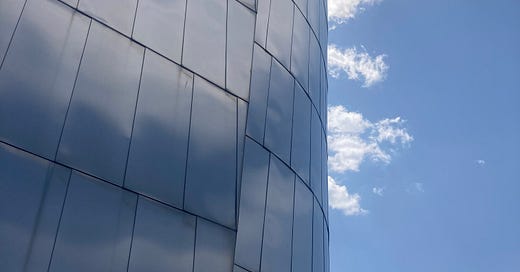You walk through the slow revolving door, everything automated here, miracles of modern medicine, shining like the gleaming glass and steel outside—and suddenly they are everywhere.
The people Jesus loves.
They have wheelchairs or oxygen tanks, masks on their faces or cannulae in their noses. They have curled hands or club feet. They slump in chairs or lean on walkers. They are missing legs, arms, eyes, hair, or hands. Everything you take for granted.
Most are old, but some are young. No one smiles. They are here for serious reasons: surgery, chemo, scans, transplants. They are wrapped in worries of their own, each folded in on themselves, carrying the burden of diagnosis, disease, or disability.
The building rises like a masterpiece above them: airy atrium, sweeping staircase, glass walls, piano music floating through cool air. Efficiency and automation rule the day: check in here, get your badge, wait your turn, slip quietly behind sleek doors.
Every prod and poke, every painful procedure takes place away from view. Patients emerge later, tired, wrapped in bandages, leaning on the arm of a companion. Suffering is everywhere, but silent.
These are the people Jesus loves.
The broken ones, the sick ones, the lost or left-behind. Too old, too young, too much for public view. Outside they are oddities, drawing stares and sneers, but inside they are held in a strange sea of normalcy: no one here is fine.
Every Tuesday I step inside, slipping from the world of the beautiful, the healthy, the breezy illusion of independence and success we call a cultural myth. I reenter the world of the wounded, where bodies break and shrink and bleed and fail.
Every week when I catch the first glimpse of a fellow patient, the same words rise like unbidden prayer on my lips. The people Jesus loves.
I used to live among them. Years ago, when I was younger and healthier than I am now, when I was more sure of myself and the world than I am today, I spent a year at L’Arche in a home for adults with disabilities. I changed soaked sheets, helped residents bathe and dress, applied ointment to wounds, pushed wheelchairs down cracked sidewalks. I tried to understand the ones who couldn’t speak; I tried to forgive the ones who hurled insults for no reason; I found myself to be as limited and longing for love as everyone else.
One year changed my life. This is what happens among the people Jesus loves.
Jesus loves all of us, sure. No theologian worth their salt would argue for any distinction in God’s outrageous outpouring of love and mercy upon those within the hospital and those without. We are all of us beloved, and this is mystery enough.
But I am telling for you certain that something happens when you are among the ones that the rest of the world—fast and certain and lusting after wealth and power—wants to ignore. You realize that you are one of them. Perhaps you could button up your brokenness for a while, stuff it inside or share it with a chosen few. But then you’d wash your face, dry your eyes, take a deep breath, and face the day with a smile. You’d pretend you were fine. More than fine, better.
Yet all it takes is one slow turn round the revolving door that never stops spinning and you step into the truth that melts away every lie between us and them.
Here are the people Jesus loves because here comes closer to the kingdom of God, where the last are first.
Here are the sick no one else wants to see, shuddering at any reminder of their own frailty, vulnerability, or mortality. But here is where Jesus dwells: within brokenness.
For years I tried to escape it. Prayed for healthy babies, quick check-ups, successful surgeries. So often things worked out. So often the worst was almost. Until it wasn’t.
Here we are, the people Jesus loves. Would you believe me if I told you it is better to know you belong among the broken?





This made me cry Laura. I am one among the ones Jesus loves..., old and disabled, muscle that no longer work, I lost my ability to walk without a walker. My hands swollen and knarled. And my husband has cancer and I am his sole caregiver.
My friends ran away when the muscle disease took over. Family as well.
I pray for you everyday and I said to you that what is happening to you stinks.
My go to book, besides Holy Scripture is Searching for and Maintaining Peace.
I have read it. Re- read it and read it again.
If your eyes are hurting Sister Miriam James reads it aloud on the Hallow App.
I have prayed for you every morning for years. Long before this horrible disease.
I guess that is what the broken old people do.
So much of my anxiety is knowing that any day could be the day when everything changes. A diagnosis, a loss, news that turns my world upside down. Your words soothed my anxious heart this morning. Praying for you and your family, Laura!